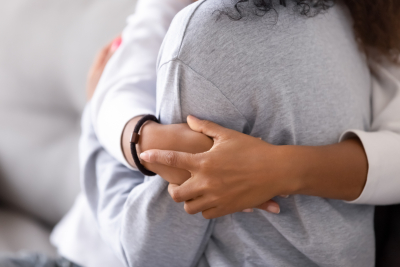New Brunswick, N.J., January 1, 2024 – Children have unique needs when a parent is diagnosed with cancer. During a parent’s treatment, children may be confused or concerned by changes in their parent’s appearance or activity. Parents might also struggle in determining when and how to talk to their children about their cancer diagnosis. Gabrielle Vitaliano MSW, LCSW, OSW-C, outpatient oncology social worker at Rutgers Cancer Institute of New Jersey, shares more about the impact of a parent’s cancer diagnosis on a child and ways to help them cope.
A child’s emotional reaction to their patent having cancer will depend on many things, including their age, how the information is given to them, and their experience with illness. Children may experience a range of conflicting emotions from sadness, fear and anxiety to anger, frustration and guilt. They may have to take on more responsibilities at home and cope with disrupted routines, changes in family dynamics and increased conflict. Research suggests that children of cancer patients are at a higher risk of poor school performance and emotional and behavioral problems. 
There are ways to help children cope with the emotional and social impact of a parent’s cancer diagnosis. Setting expectations for what life may look like as you navigate your cancer diagnosis will help decrease anxieties for your child. Maintain as much normalcy for the child as possible, implementing consistent routines and continuation of normal activities. Get a friend to take your kids to sports practices or ask someone to bring dinner if needed. It's important to let kids be kids and to maintain normal parent/child roles and responsibilities as much as possible.
Communication is vital. Children are perceptive and will catch on to the physical, emotional, and physiological changes occurring around them, so it is important to keep your child informed by giving them a clear description of your diagnosis and treatment. Don’t be afraid to use the word cancer. Euphemisms like “boo-boo” and “bump” are confusing for children. Be prepared to repeat information and explanations more than one time, as some information may be hard to accept or understand. Recognize that it’s okay to not have all the answers, but to let your child know that you will continue to update them as you receive more information.
If you or your child are having a hard time coping with the changes that a cancer diagnosis brings, connect with your oncology social worker for extra support. Social Work Services at Rutgers Cancer Institute helps patients and their families effectively cope with the logistical and emotional difficulties of cancer. For additional support and educational programs visit our Patient Support Services page.
Rutgers Cancer Institute together with RWJBarnabas Health is, the state’s leading cancer program and only National Cancer Institute-designated Comprehensive Cancer Center
For journalists – contact:
Krista Didzbalis
Media Relations Specialist
732-507-8307
krista.didzbalis@rutgers.edu

